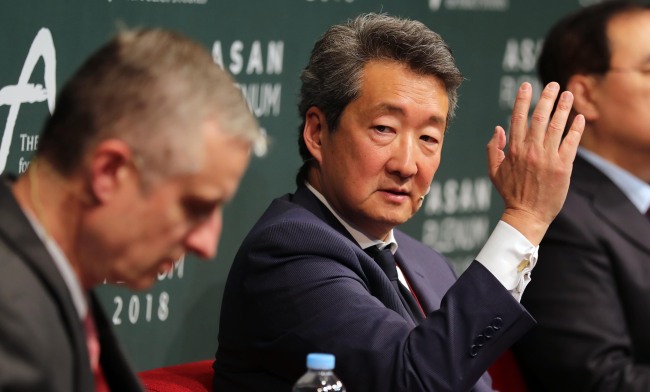US President Donald Trump and North Korean leader Kim Jong-un may agree to a statement on peace and denuclearization during the planned summit, but it could still pose challenges in follow-up negotiations, a Korea expert Victor Cha said Tuesday.
“It does raise a question of how much leaders can accomplish when there is no groundwork done in advance,” said Cha, who was once under consideration for US ambassador to South Korea, during a press conference on the sidelines of the Asan Plenum conference hosted by the Asan Institute for Policy Studies.
“When there is very little preparatory work before the leaders meet, I think you will get some bold announcements about denuclearization and peace. That is not a bad thing, but then you are still stuck with the negotiations.”
”The whole world will be watching the summit. So in that sense, the president also doesn‘t like failure,” he said. “So at the minimum, they will have a very positive statement, but we will see if he tries to get more than that, something that we haven’t seen before.”
“The devil was always in the details.”
 |
Victor Cha (center) |
Trump and Kim are planning to hold a summit in May or in early June to discuss North Korea’s nuclear weapons programs. On Friday, setting the stage for the North Korea-US summit, South Korean President Moon Jae-in will sit down with Kim for talks, with the North’s “denuclearization” and establishing a peace regime on the peninsula expected to top the agenda.
After the North Korea-US summit, the negotiations would follow, with the process likely to be led by Secretary of State nominee Mike Pompeo or Trump’s national security adviser John Bolton, who are both known as hawkish on the North.
Cha “welcomed” all the latest announcements by the reclusive regime -- its decision not to conduct nuclear and missile tests and to shut down a nuclear test site, as well as its purported willingness not to seek a withdrawal of the US Forces based in South Korea.
But he remained skeptical, saying that there isn’t “anything new” about the announcements.
“These are positive developments, we should welcome them, but there isn’t anything new yet,” said Cha, who served as Asian affairs director on the National Security Council of George W. Bush.
He also pointed out that the biggest potential obstacle in the upcoming summits could be “unconventional thinking and actions.”
Cha described as “unconventional” the two leaders, who, he said, are not easily scripted.
“Unconventionality is great if it succeeds, but if it fails, it shouldn‘t be harmless, it shouldn’t be disastrous. And stakes are very high,” he said.
Edwin Feulner, founder and former president of The Heritage Foundation, echoed a similar view without elaborating on whether the leaders‘ “strong personalities” would help yield a positive outcome in the upcoming US-North Korea summit.
“I understand they are both forceful and strong individuals,” he said during a separate press conference. “This is going to be the first bilateral summit and meeting like this makes it not only historic, but particularly notable.”
Trump will enter the negotiations in a strong position to draw a “satisfactory, verifiable and instantly implementable solution to the challenges the whole world faces,” he said.
By Ock Hyun-ju (
laeticia.ock@heraldcorp.com)





![[Exclusive] Hyundai Mobis eyes closer ties with BYD](http://res.heraldm.com/phpwas/restmb_idxmake.php?idx=644&simg=/content/image/2024/11/25/20241125050044_0.jpg)
![[Herald Review] 'Gangnam B-Side' combines social realism with masterful suspense, performance](http://res.heraldm.com/phpwas/restmb_idxmake.php?idx=644&simg=/content/image/2024/11/25/20241125050072_0.jpg)

